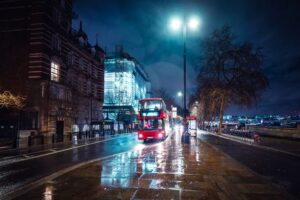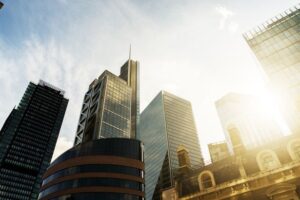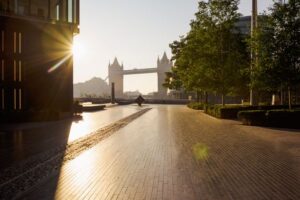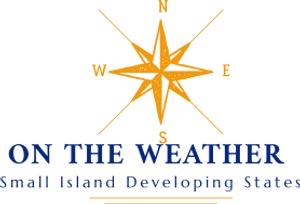
“Even when it’s not raining, we have to be on guard and on the lookout because the Odaw River rapidly swells up with upstream flood water, which can suddenly flow into our home and the market without warning.”
This lament, from a female market trader in Accra, Ghana, epitomizes the anxiety that permeates the daily existence of those working and living in informal conditions in African cities, an anxiety which will only get worse as extreme weather events triggered by climate change become more common in Africa. As the fastest-urbanizing region of the world, Africa’s cities are expanding due to both migration and national population growth, but the provision of jobs, services, and durable housing has not kept pace. Consequently, 65 percent of total employment in Africa is in the informal sector, providing services such as small-scale retail, repair, hairdressing, and tailoring within open-air markets or from home.
Approximately 56 percent of urban residents—double the global average—live in slum housing, which is defined as lack of durable housing, unaffordable access to safe drink water and adequate sanitation, insecurity of tenure, and insufficient living space.
The informal city—viewed here as the pockets of a city dominated by slums and informal sector work—is particularly vulnerable to climate change impacts for several reasons. First, high-intensity precipitation can flood houses and places of work, damaging assets and increasing exposure to water-borne diseases. Excess heat can contribute to the “urban heat island” effect whereby heat absorption by built-up surfaces can endanger the health of those working and living in poorly ventilated homes and markets. Third, increased drought can compromise water supply, worsening fire risks in markets and slums while also reducing hydropower resources and thus exacerbating electricity shortages, hurting informal businesses. Fourth, higher sea levels and tides will increase flooding in Africa’s low-elevation coastal zones where population growth will increase in the coming decade. Yet, national climate change action plans (NCCAPs) prepared by African governments tend to overlook the threats to communities living and working in informal settings.
In a recent chapter prepared for the Global Center on Adaptation’s State and Trends in Adaptation Report 2022, we examine these challenges for informal communities in more detail by focusing on Accra, Ghana. We draw on interviews with policymakers and local politicians as well as focus group discussions with market traders, neighborhood associations, and traditional authorities to develop a framework about how climate change and informality intersect in African cities and to map out the tensions between formal governance structures and the realities of the informal city that obstruct inclusive adaptation.
Ghana is typical of other countries in the region that are increasingly affected by the impacts of climate change, including more volatile shifts in rainfall and heat. The capital city of Accra is one of Ghana’s 261 local government administrations. While the city has a population of about 2.6 million, it is also part of the larger Greater Accra Metropolitan Area (GAMA), which contains about 15 percent of Ghana’s total population. Accra’s low-lying elevation makes it increasingly vulnerable to climate volatility. In addition to flooding from excessive rainfall, Accra receives water runoffs flowing downward from other municipalities. The city is also affected by overflows from the Odaw River, the Korle Lagoon, and the Onyasia River as well as the growth in impervious surface areas, insufficient drainage, improper disposal of waste, and haphazard construction on waterways.
The threat of climate change has not gone unnoticed by Ghana’s policymakers, and several large-scale adaptation initiatives are underway, including drainage investments, expanding access to energy-efficient building materials, and paving alleyways in informal settlements. However, most initiatives do not address the realities of the informal city. First, there is a vast degree of institutional coordination required to address climate adaptation in informal communities within cities, especially in countries with relatively high levels of decentralization. In Ghana, at least 10 national ministries have a role to play in either climate, employment, housing, or urban development. Moreover, since climate issues are often cross-jurisdictional, the Accra city government must coordinate with a broad range of other local governments in GAMA that have variable levels of capacities and resources. There are numerous informal sector organizations in Accra, but the maze of government actors impedes these organizations from advocating for their interests and identifying who should be held accountable for adaptation investment deficiencies and failures.
Second, insecure land tenure is an underlying contributor to the growth of informal slums in Accra and elsewhere and a major hindrance for climate adaptation investments. Upgrading housing structures and urban infrastructure may be possible in communities where land was acquired legally, but it is contentious in communities living in illegal settlements, such as those on government or private land. This is a central challenge in the settlement of Old Fadama, one of Ghana’s largest slums; because it emerged organically from a wetlands area, it is highly vulnerable to frequent flooding. Most notably, floods in 2015 caused the deaths of more than 150 people in Accra, leading the government to demolish parts of the community near the Korle Lagoon so as to deepen and widen it. A history of eviction campaigns and poorly planned resettlement efforts has undermined trust in local authorities’ intentions, and the settlement’s extra-legal status implies that the government is not legally responsible for providing services to residents. As one traditional authority in Old Fadama exclaimed, “The District Assembly officials cannot dare come into this community to collect taxes. What have they done for us?”
Trust is equally a concern for those working in the informal sector, especially those engaged in street hawking. By-laws within local governments often criminalize such vendors for encroaching on public space. Several of Accra’s past mayors have pursued “decongestion” campaigns against informal workers, especially street vendors, even though there are few viable alternative places for such traders to locate.
Political economy dynamics are a recurrent factor in addressing the priorities of market traders and residents of informal housing. Government authorities, both national and local, often have been more interested in attracting investment for tourism, business, and high-end housing, while having few incentives outside of electoral periods to provide goods and services to the informal city. Politicians from all parties promise to protect residents during campaign periods only to abandon them after elections take place.
Overall, our chapter emphasizes that a broader set of priorities is needed in climate change discussions to address the impacts on the most vulnerable in African cities. Global events such as the current COP27 climate conference place a heavy emphasis on financing for green infrastructure and for green jobs. While such policy thrusts are important, they will need to be bundled with institutional, legal, trust-building, and capacity strengthening reforms in order for adaptation interventions to truly be transformative.









